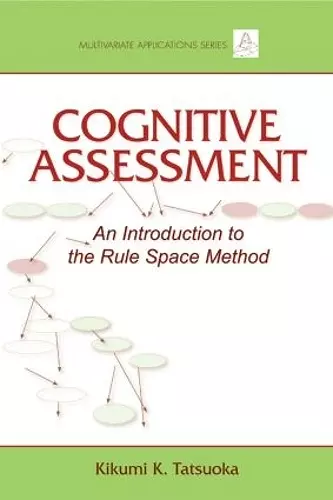Cognitive Assessment
An Introduction to the Rule Space Method
Format:Paperback
Publisher:Taylor & Francis Ltd
Published:22nd May '09
Currently unavailable, and unfortunately no date known when it will be back
This paperback is available in another edition too:
- Hardback£160.00(9780805828283)

This book introduces a new methodology for the analysis of test results. Free from ambiguous interpretations, the results truly demonstrate an individual’s progress. The methodology is ideal for highlighting patterns derived from test scores used in evaluating progress. Dr. Tatsuoka introduces readers to the Rule Space Method (RSM), a technique that transforms unobservable knowledge and skill variables into observable and measurable attributes. RSM converts item response patterns into attribute mastery probabilities. RSM is the only up-to-date methodology that can handle large scale assessment for tests such as the SAT and PSAT. PSAT used the results from this methodology to create cognitively diagnostic scoring reports. In this capacity, RSM helps teachers understand what scores mean by helping them ascertain an individual’s cognitive strengths and weaknesses. For example, two students may have the exact same score, but for different reasons. One student might excel at processing grammatically complex texts but miss the main idea of the prose, while another excels at understanding the global message. Such knowledge helps teachers customize a student’s education to his or her cognitive abilities. RSM is also used for medical diagnoses, genetics research, and to help classify music into various states of emotions for treating mental problems.
The book opens with an overview of cognitive assessment research and nonparametric and parametric person-fit statistics. The Q-matrix theory is then introduced followed by the Rule Space method. Various properties of attribute mastery probabilities are then introduced along with the reliability theory of attributes and its connection to classical and item response theory. The book concludes with a discussion of how the construct validity of a test can be clarified with the Rule Space method.
Intended for researchers and graduate students in quantitative, educational, and cognitive psychology, this book also appeals to those in computer science, neuroscience, medicine, and mathematics. The book is appropriate for advanced courses on cognometrics, latent class structures, and advanced psychometrics as well as statistical pattern recognition and classification courses taught in statistics and/or math departments.
"Dr. K. Tatsuoka's book demonstrates rich content and brilliant work [that] provides a possible template for assessing the reliability of the underlying cognitive processes of an assessment. Examples span a rich and wide domain reflecting the author’s work in applying rule space to a wide array of assessments. … The book will absolutely make a significant contribution to the field." - Gwyneth M. Boodoo, President, GMB Enterprises
"This book reflects [Dr. K. Tatsuoka's] accomplishments and contributions to educational assessment. It is remarkable in its extensiveness." - Leona Aiken, Arizona State University
"Dr. K. Tatsuoka's Rule Space Methodology is innovative and illuminating in its ability to assess and delineate the underlying pattern of cognitive skills and knowledge for individuals from a set of test scores." - Lisa Harlow, University of Rhode Island
ISBN: 9781848728134
Dimensions: unknown
Weight: 640g
344 pages